Organisational Behaviour Report: Morrison's, Motivation, and Teams
VerifiedAdded on 2023/01/06
|15
|4612
|82
Report
AI Summary
This report delves into the realm of organisational behaviour, focusing on the context of Morrison's, a major supermarket chain. The report begins by examining the impact of culture, power, and politics on individual and team behaviour and performance, outlining different cultural models and their implications. It then explores motivation theories, including content and process theories, with specific attention to reinforcement and Herzberg's two-factor theory, and how they influence employee behaviour. The report further investigates team dynamics, differentiating between effective and ineffective teams, and analysing relevant team theories. Finally, it discusses various concepts and philosophies of organisational behaviour, providing critical analysis and evaluation of the theories discussed, all within the context of Morrison's. The report offers insights into how these factors affect employee efficiency, productivity, and the overall achievement of organisational goals.
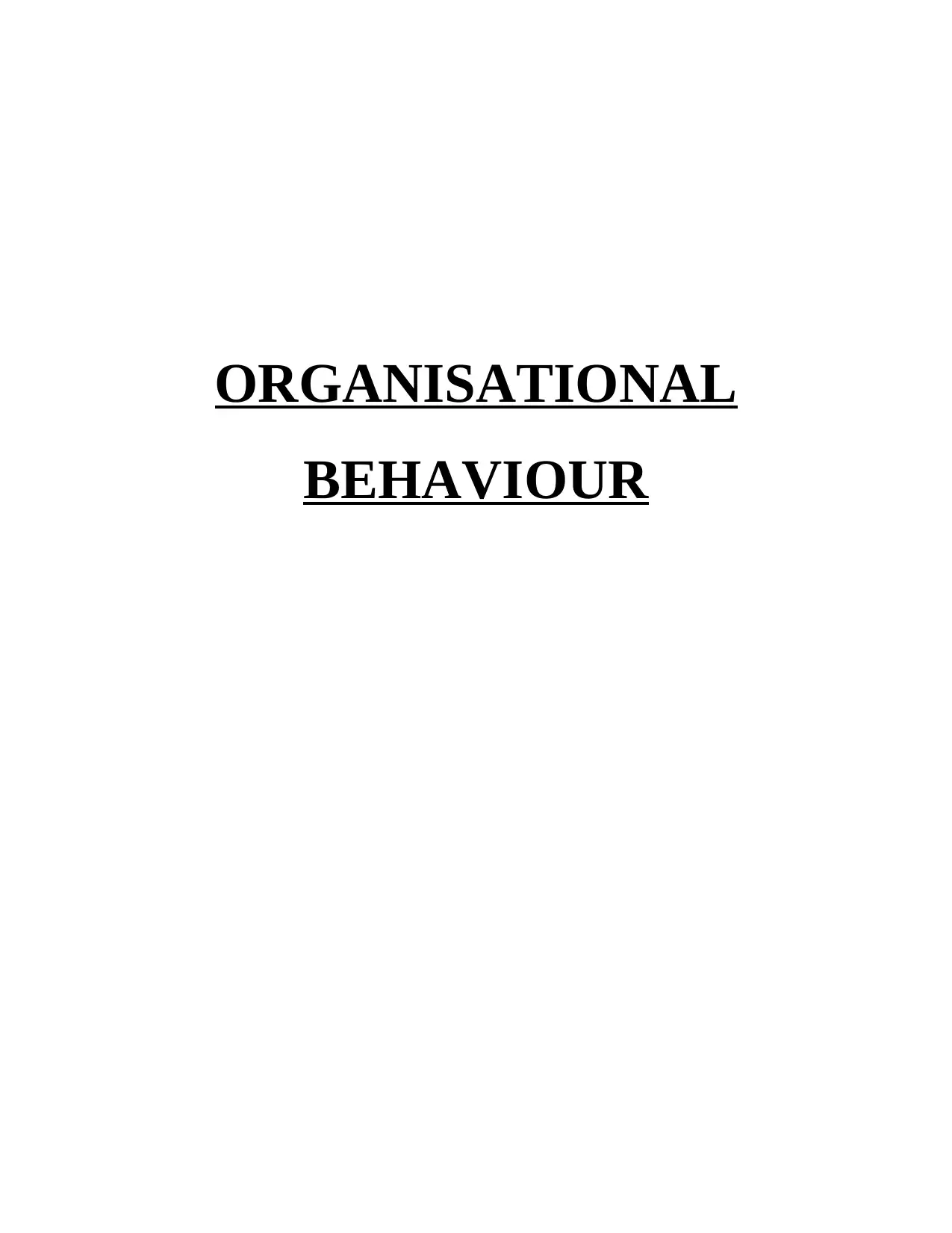
ORGANISATIONAL
BEHAVIOUR
BEHAVIOUR
Paraphrase This Document
Need a fresh take? Get an instant paraphrase of this document with our AI Paraphraser
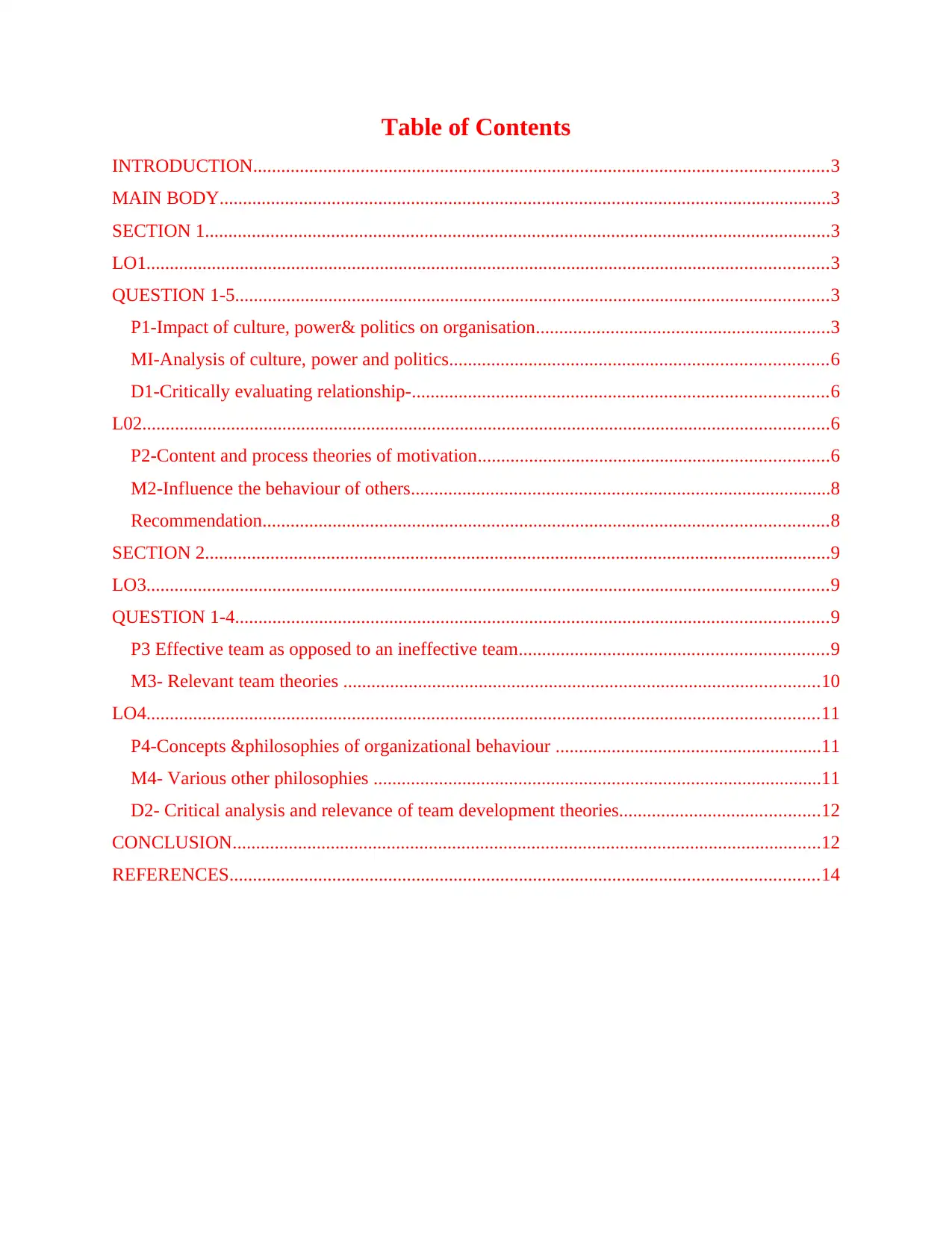
Table of Contents
INTRODUCTION...........................................................................................................................3
MAIN BODY...................................................................................................................................3
SECTION 1......................................................................................................................................3
LO1..................................................................................................................................................3
QUESTION 1-5...............................................................................................................................3
P1-Impact of culture, power& politics on organisation...............................................................3
MI-Analysis of culture, power and politics.................................................................................6
D1-Critically evaluating relationship-.........................................................................................6
L02...................................................................................................................................................6
P2-Content and process theories of motivation...........................................................................6
M2-Influence the behaviour of others..........................................................................................8
Recommendation.........................................................................................................................8
SECTION 2......................................................................................................................................9
LO3..................................................................................................................................................9
QUESTION 1-4...............................................................................................................................9
P3 Effective team as opposed to an ineffective team..................................................................9
M3- Relevant team theories ......................................................................................................10
LO4................................................................................................................................................11
P4-Concepts &philosophies of organizational behaviour .........................................................11
M4- Various other philosophies ................................................................................................11
D2- Critical analysis and relevance of team development theories...........................................12
CONCLUSION..............................................................................................................................12
REFERENCES..............................................................................................................................14
INTRODUCTION...........................................................................................................................3
MAIN BODY...................................................................................................................................3
SECTION 1......................................................................................................................................3
LO1..................................................................................................................................................3
QUESTION 1-5...............................................................................................................................3
P1-Impact of culture, power& politics on organisation...............................................................3
MI-Analysis of culture, power and politics.................................................................................6
D1-Critically evaluating relationship-.........................................................................................6
L02...................................................................................................................................................6
P2-Content and process theories of motivation...........................................................................6
M2-Influence the behaviour of others..........................................................................................8
Recommendation.........................................................................................................................8
SECTION 2......................................................................................................................................9
LO3..................................................................................................................................................9
QUESTION 1-4...............................................................................................................................9
P3 Effective team as opposed to an ineffective team..................................................................9
M3- Relevant team theories ......................................................................................................10
LO4................................................................................................................................................11
P4-Concepts &philosophies of organizational behaviour .........................................................11
M4- Various other philosophies ................................................................................................11
D2- Critical analysis and relevance of team development theories...........................................12
CONCLUSION..............................................................................................................................12
REFERENCES..............................................................................................................................14
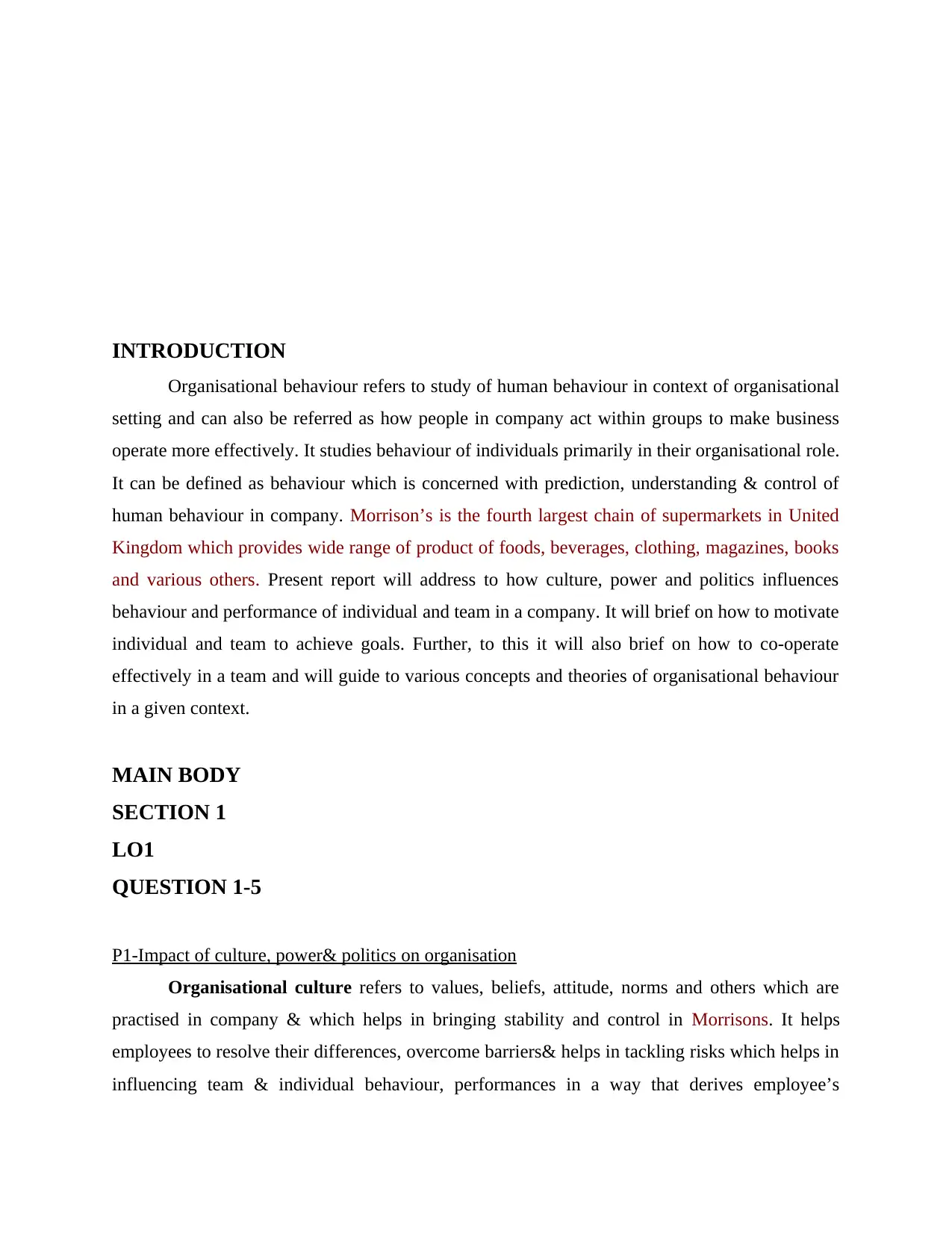
INTRODUCTION
Organisational behaviour refers to study of human behaviour in context of organisational
setting and can also be referred as how people in company act within groups to make business
operate more effectively. It studies behaviour of individuals primarily in their organisational role.
It can be defined as behaviour which is concerned with prediction, understanding & control of
human behaviour in company. Morrison’s is the fourth largest chain of supermarkets in United
Kingdom which provides wide range of product of foods, beverages, clothing, magazines, books
and various others. Present report will address to how culture, power and politics influences
behaviour and performance of individual and team in a company. It will brief on how to motivate
individual and team to achieve goals. Further, to this it will also brief on how to co-operate
effectively in a team and will guide to various concepts and theories of organisational behaviour
in a given context.
MAIN BODY
SECTION 1
LO1
QUESTION 1-5
P1-Impact of culture, power& politics on organisation
Organisational culture refers to values, beliefs, attitude, norms and others which are
practised in company & which helps in bringing stability and control in Morrisons. It helps
employees to resolve their differences, overcome barriers& helps in tackling risks which helps in
influencing team & individual behaviour, performances in a way that derives employee’s
Organisational behaviour refers to study of human behaviour in context of organisational
setting and can also be referred as how people in company act within groups to make business
operate more effectively. It studies behaviour of individuals primarily in their organisational role.
It can be defined as behaviour which is concerned with prediction, understanding & control of
human behaviour in company. Morrison’s is the fourth largest chain of supermarkets in United
Kingdom which provides wide range of product of foods, beverages, clothing, magazines, books
and various others. Present report will address to how culture, power and politics influences
behaviour and performance of individual and team in a company. It will brief on how to motivate
individual and team to achieve goals. Further, to this it will also brief on how to co-operate
effectively in a team and will guide to various concepts and theories of organisational behaviour
in a given context.
MAIN BODY
SECTION 1
LO1
QUESTION 1-5
P1-Impact of culture, power& politics on organisation
Organisational culture refers to values, beliefs, attitude, norms and others which are
practised in company & which helps in bringing stability and control in Morrisons. It helps
employees to resolve their differences, overcome barriers& helps in tackling risks which helps in
influencing team & individual behaviour, performances in a way that derives employee’s
⊘ This is a preview!⊘
Do you want full access?
Subscribe today to unlock all pages.

Trusted by 1+ million students worldwide
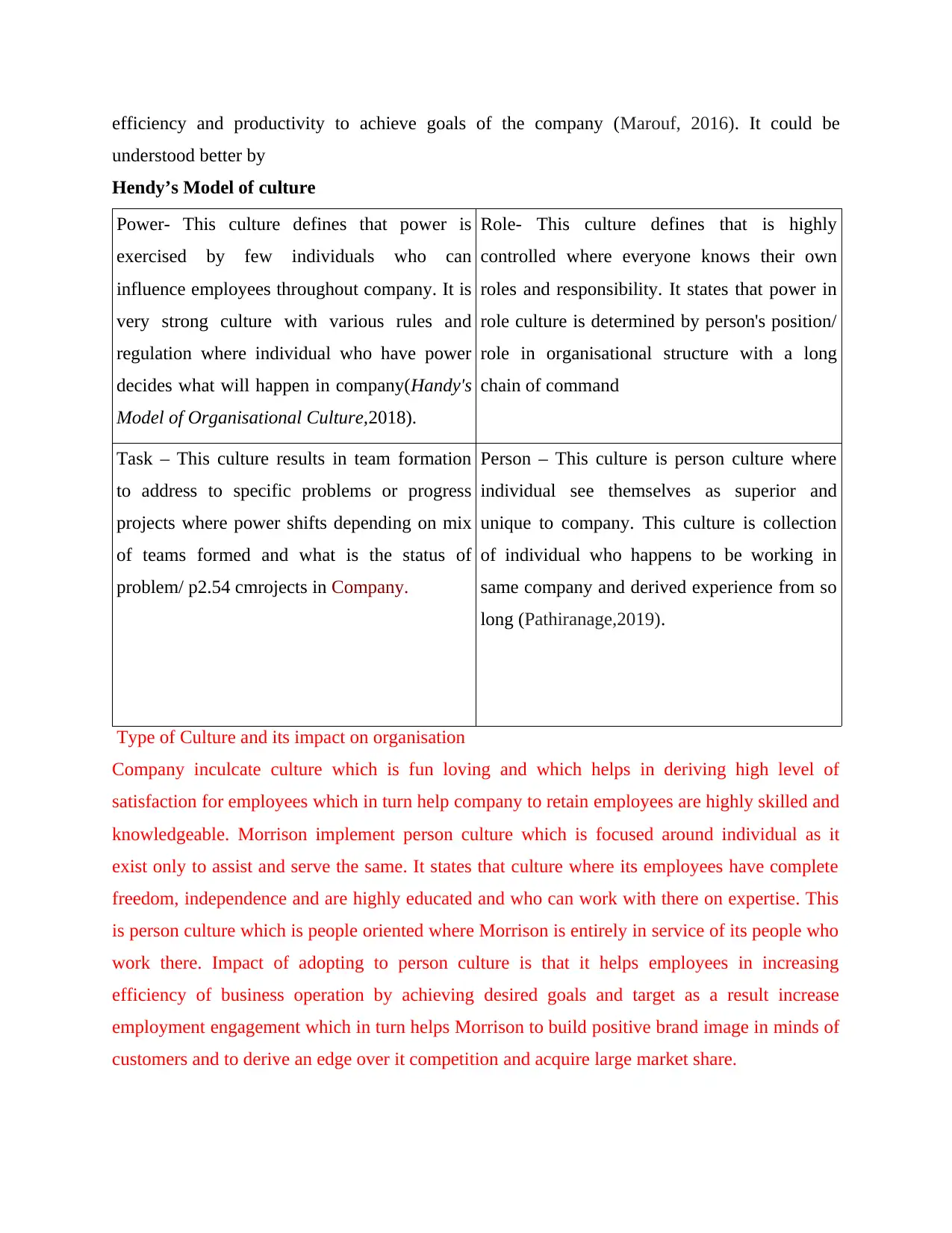
efficiency and productivity to achieve goals of the company (Marouf, 2016). It could be
understood better by
Hendy’s Model of culture
Power- This culture defines that power is
exercised by few individuals who can
influence employees throughout company. It is
very strong culture with various rules and
regulation where individual who have power
decides what will happen in company(Handy's
Model of Organisational Culture,2018).
Role- This culture defines that is highly
controlled where everyone knows their own
roles and responsibility. It states that power in
role culture is determined by person's position/
role in organisational structure with a long
chain of command
Task – This culture results in team formation
to address to specific problems or progress
projects where power shifts depending on mix
of teams formed and what is the status of
problem/ p2.54 cmrojects in Company.
Person – This culture is person culture where
individual see themselves as superior and
unique to company. This culture is collection
of individual who happens to be working in
same company and derived experience from so
long (Pathiranage,2019).
Type of Culture and its impact on organisation
Company inculcate culture which is fun loving and which helps in deriving high level of
satisfaction for employees which in turn help company to retain employees are highly skilled and
knowledgeable. Morrison implement person culture which is focused around individual as it
exist only to assist and serve the same. It states that culture where its employees have complete
freedom, independence and are highly educated and who can work with there on expertise. This
is person culture which is people oriented where Morrison is entirely in service of its people who
work there. Impact of adopting to person culture is that it helps employees in increasing
efficiency of business operation by achieving desired goals and target as a result increase
employment engagement which in turn helps Morrison to build positive brand image in minds of
customers and to derive an edge over it competition and acquire large market share.
understood better by
Hendy’s Model of culture
Power- This culture defines that power is
exercised by few individuals who can
influence employees throughout company. It is
very strong culture with various rules and
regulation where individual who have power
decides what will happen in company(Handy's
Model of Organisational Culture,2018).
Role- This culture defines that is highly
controlled where everyone knows their own
roles and responsibility. It states that power in
role culture is determined by person's position/
role in organisational structure with a long
chain of command
Task – This culture results in team formation
to address to specific problems or progress
projects where power shifts depending on mix
of teams formed and what is the status of
problem/ p2.54 cmrojects in Company.
Person – This culture is person culture where
individual see themselves as superior and
unique to company. This culture is collection
of individual who happens to be working in
same company and derived experience from so
long (Pathiranage,2019).
Type of Culture and its impact on organisation
Company inculcate culture which is fun loving and which helps in deriving high level of
satisfaction for employees which in turn help company to retain employees are highly skilled and
knowledgeable. Morrison implement person culture which is focused around individual as it
exist only to assist and serve the same. It states that culture where its employees have complete
freedom, independence and are highly educated and who can work with there on expertise. This
is person culture which is people oriented where Morrison is entirely in service of its people who
work there. Impact of adopting to person culture is that it helps employees in increasing
efficiency of business operation by achieving desired goals and target as a result increase
employment engagement which in turn helps Morrison to build positive brand image in minds of
customers and to derive an edge over it competition and acquire large market share.
Paraphrase This Document
Need a fresh take? Get an instant paraphrase of this document with our AI Paraphraser
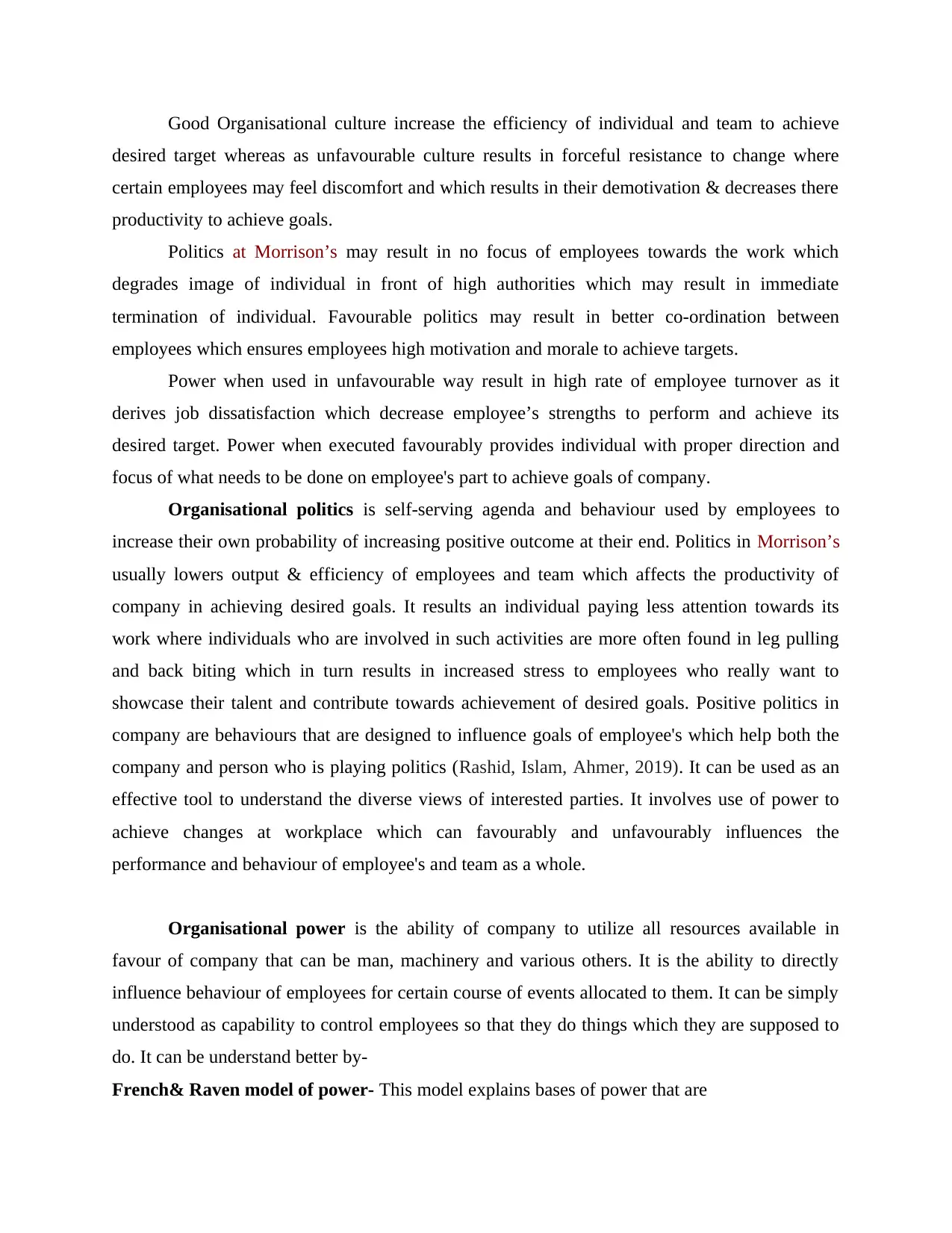
Good Organisational culture increase the efficiency of individual and team to achieve
desired target whereas as unfavourable culture results in forceful resistance to change where
certain employees may feel discomfort and which results in their demotivation & decreases there
productivity to achieve goals.
Politics at Morrison’s may result in no focus of employees towards the work which
degrades image of individual in front of high authorities which may result in immediate
termination of individual. Favourable politics may result in better co-ordination between
employees which ensures employees high motivation and morale to achieve targets.
Power when used in unfavourable way result in high rate of employee turnover as it
derives job dissatisfaction which decrease employee’s strengths to perform and achieve its
desired target. Power when executed favourably provides individual with proper direction and
focus of what needs to be done on employee's part to achieve goals of company.
Organisational politics is self-serving agenda and behaviour used by employees to
increase their own probability of increasing positive outcome at their end. Politics in Morrison’s
usually lowers output & efficiency of employees and team which affects the productivity of
company in achieving desired goals. It results an individual paying less attention towards its
work where individuals who are involved in such activities are more often found in leg pulling
and back biting which in turn results in increased stress to employees who really want to
showcase their talent and contribute towards achievement of desired goals. Positive politics in
company are behaviours that are designed to influence goals of employee's which help both the
company and person who is playing politics (Rashid, Islam, Ahmer, 2019). It can be used as an
effective tool to understand the diverse views of interested parties. It involves use of power to
achieve changes at workplace which can favourably and unfavourably influences the
performance and behaviour of employee's and team as a whole.
Organisational power is the ability of company to utilize all resources available in
favour of company that can be man, machinery and various others. It is the ability to directly
influence behaviour of employees for certain course of events allocated to them. It can be simply
understood as capability to control employees so that they do things which they are supposed to
do. It can be understand better by-
French& Raven model of power- This model explains bases of power that are
desired target whereas as unfavourable culture results in forceful resistance to change where
certain employees may feel discomfort and which results in their demotivation & decreases there
productivity to achieve goals.
Politics at Morrison’s may result in no focus of employees towards the work which
degrades image of individual in front of high authorities which may result in immediate
termination of individual. Favourable politics may result in better co-ordination between
employees which ensures employees high motivation and morale to achieve targets.
Power when used in unfavourable way result in high rate of employee turnover as it
derives job dissatisfaction which decrease employee’s strengths to perform and achieve its
desired target. Power when executed favourably provides individual with proper direction and
focus of what needs to be done on employee's part to achieve goals of company.
Organisational politics is self-serving agenda and behaviour used by employees to
increase their own probability of increasing positive outcome at their end. Politics in Morrison’s
usually lowers output & efficiency of employees and team which affects the productivity of
company in achieving desired goals. It results an individual paying less attention towards its
work where individuals who are involved in such activities are more often found in leg pulling
and back biting which in turn results in increased stress to employees who really want to
showcase their talent and contribute towards achievement of desired goals. Positive politics in
company are behaviours that are designed to influence goals of employee's which help both the
company and person who is playing politics (Rashid, Islam, Ahmer, 2019). It can be used as an
effective tool to understand the diverse views of interested parties. It involves use of power to
achieve changes at workplace which can favourably and unfavourably influences the
performance and behaviour of employee's and team as a whole.
Organisational power is the ability of company to utilize all resources available in
favour of company that can be man, machinery and various others. It is the ability to directly
influence behaviour of employees for certain course of events allocated to them. It can be simply
understood as capability to control employees so that they do things which they are supposed to
do. It can be understand better by-
French& Raven model of power- This model explains bases of power that are
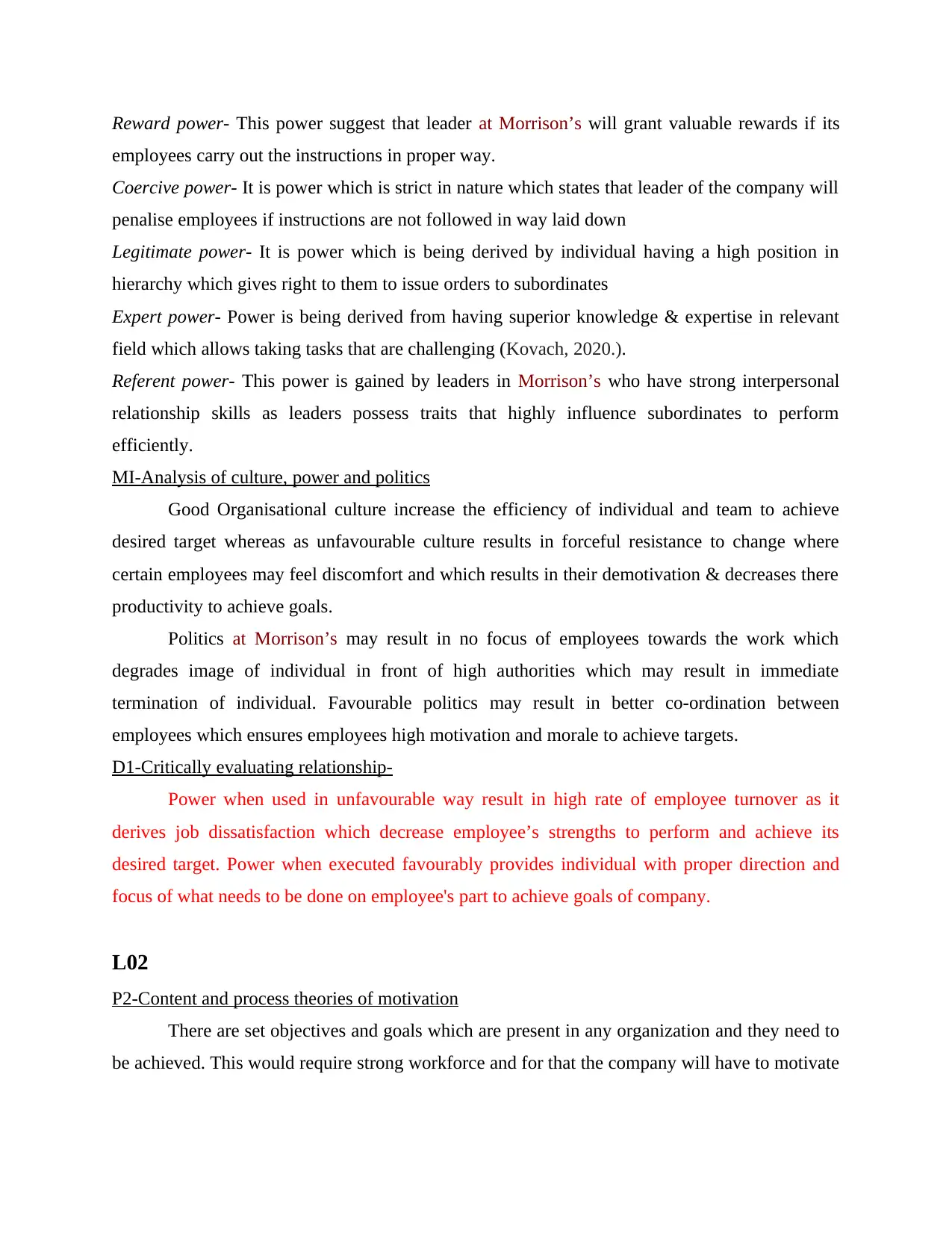
Reward power- This power suggest that leader at Morrison’s will grant valuable rewards if its
employees carry out the instructions in proper way.
Coercive power- It is power which is strict in nature which states that leader of the company will
penalise employees if instructions are not followed in way laid down
Legitimate power- It is power which is being derived by individual having a high position in
hierarchy which gives right to them to issue orders to subordinates
Expert power- Power is being derived from having superior knowledge & expertise in relevant
field which allows taking tasks that are challenging (Kovach, 2020.).
Referent power- This power is gained by leaders in Morrison’s who have strong interpersonal
relationship skills as leaders possess traits that highly influence subordinates to perform
efficiently.
MI-Analysis of culture, power and politics
Good Organisational culture increase the efficiency of individual and team to achieve
desired target whereas as unfavourable culture results in forceful resistance to change where
certain employees may feel discomfort and which results in their demotivation & decreases there
productivity to achieve goals.
Politics at Morrison’s may result in no focus of employees towards the work which
degrades image of individual in front of high authorities which may result in immediate
termination of individual. Favourable politics may result in better co-ordination between
employees which ensures employees high motivation and morale to achieve targets.
D1-Critically evaluating relationship-
Power when used in unfavourable way result in high rate of employee turnover as it
derives job dissatisfaction which decrease employee’s strengths to perform and achieve its
desired target. Power when executed favourably provides individual with proper direction and
focus of what needs to be done on employee's part to achieve goals of company.
L02
P2-Content and process theories of motivation
There are set objectives and goals which are present in any organization and they need to
be achieved. This would require strong workforce and for that the company will have to motivate
employees carry out the instructions in proper way.
Coercive power- It is power which is strict in nature which states that leader of the company will
penalise employees if instructions are not followed in way laid down
Legitimate power- It is power which is being derived by individual having a high position in
hierarchy which gives right to them to issue orders to subordinates
Expert power- Power is being derived from having superior knowledge & expertise in relevant
field which allows taking tasks that are challenging (Kovach, 2020.).
Referent power- This power is gained by leaders in Morrison’s who have strong interpersonal
relationship skills as leaders possess traits that highly influence subordinates to perform
efficiently.
MI-Analysis of culture, power and politics
Good Organisational culture increase the efficiency of individual and team to achieve
desired target whereas as unfavourable culture results in forceful resistance to change where
certain employees may feel discomfort and which results in their demotivation & decreases there
productivity to achieve goals.
Politics at Morrison’s may result in no focus of employees towards the work which
degrades image of individual in front of high authorities which may result in immediate
termination of individual. Favourable politics may result in better co-ordination between
employees which ensures employees high motivation and morale to achieve targets.
D1-Critically evaluating relationship-
Power when used in unfavourable way result in high rate of employee turnover as it
derives job dissatisfaction which decrease employee’s strengths to perform and achieve its
desired target. Power when executed favourably provides individual with proper direction and
focus of what needs to be done on employee's part to achieve goals of company.
L02
P2-Content and process theories of motivation
There are set objectives and goals which are present in any organization and they need to
be achieved. This would require strong workforce and for that the company will have to motivate
⊘ This is a preview!⊘
Do you want full access?
Subscribe today to unlock all pages.

Trusted by 1+ million students worldwide
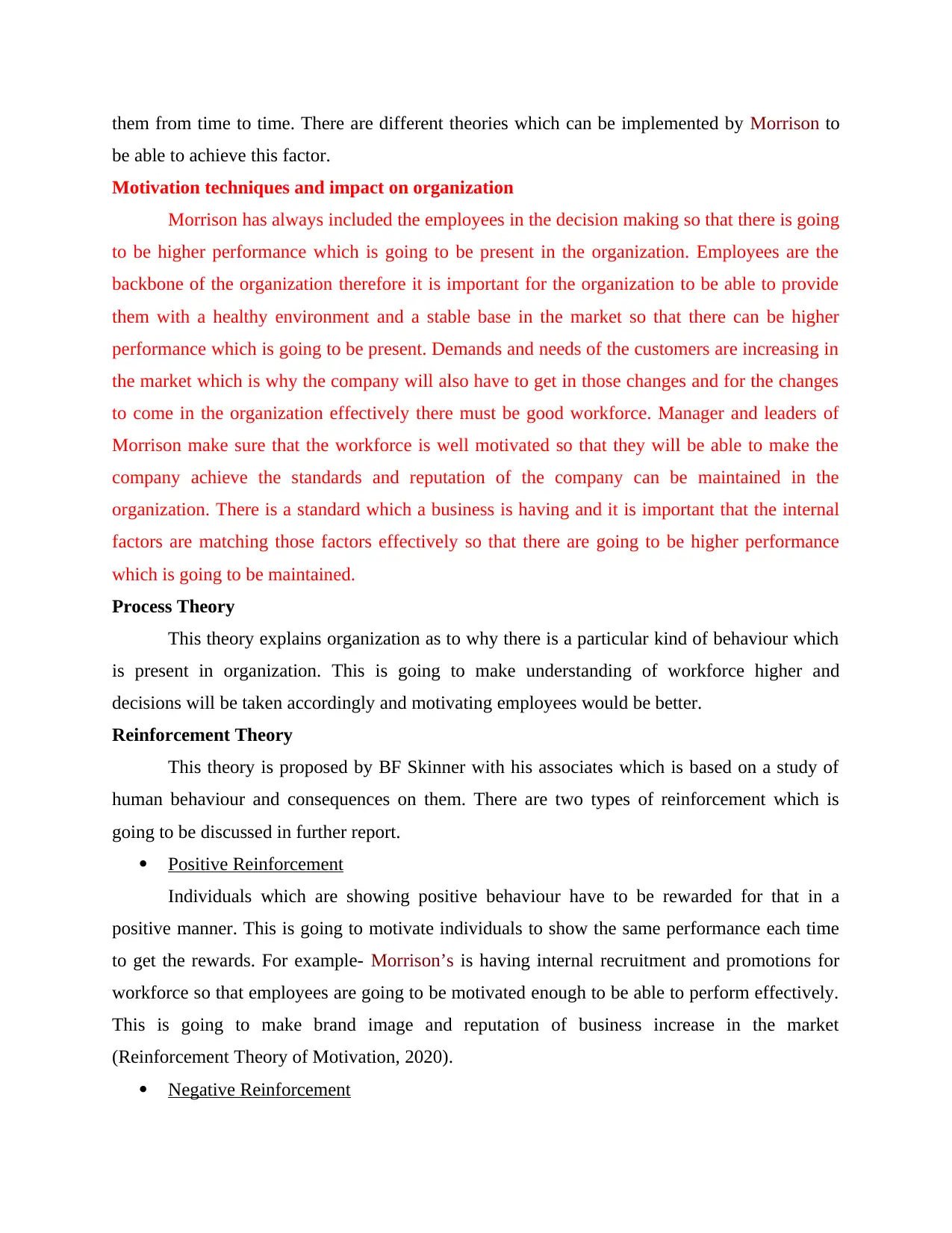
them from time to time. There are different theories which can be implemented by Morrison to
be able to achieve this factor.
Motivation techniques and impact on organization
Morrison has always included the employees in the decision making so that there is going
to be higher performance which is going to be present in the organization. Employees are the
backbone of the organization therefore it is important for the organization to be able to provide
them with a healthy environment and a stable base in the market so that there can be higher
performance which is going to be present. Demands and needs of the customers are increasing in
the market which is why the company will also have to get in those changes and for the changes
to come in the organization effectively there must be good workforce. Manager and leaders of
Morrison make sure that the workforce is well motivated so that they will be able to make the
company achieve the standards and reputation of the company can be maintained in the
organization. There is a standard which a business is having and it is important that the internal
factors are matching those factors effectively so that there are going to be higher performance
which is going to be maintained.
Process Theory
This theory explains organization as to why there is a particular kind of behaviour which
is present in organization. This is going to make understanding of workforce higher and
decisions will be taken accordingly and motivating employees would be better.
Reinforcement Theory
This theory is proposed by BF Skinner with his associates which is based on a study of
human behaviour and consequences on them. There are two types of reinforcement which is
going to be discussed in further report.
Positive Reinforcement
Individuals which are showing positive behaviour have to be rewarded for that in a
positive manner. This is going to motivate individuals to show the same performance each time
to get the rewards. For example- Morrison’s is having internal recruitment and promotions for
workforce so that employees are going to be motivated enough to be able to perform effectively.
This is going to make brand image and reputation of business increase in the market
(Reinforcement Theory of Motivation, 2020).
Negative Reinforcement
be able to achieve this factor.
Motivation techniques and impact on organization
Morrison has always included the employees in the decision making so that there is going
to be higher performance which is going to be present in the organization. Employees are the
backbone of the organization therefore it is important for the organization to be able to provide
them with a healthy environment and a stable base in the market so that there can be higher
performance which is going to be present. Demands and needs of the customers are increasing in
the market which is why the company will also have to get in those changes and for the changes
to come in the organization effectively there must be good workforce. Manager and leaders of
Morrison make sure that the workforce is well motivated so that they will be able to make the
company achieve the standards and reputation of the company can be maintained in the
organization. There is a standard which a business is having and it is important that the internal
factors are matching those factors effectively so that there are going to be higher performance
which is going to be maintained.
Process Theory
This theory explains organization as to why there is a particular kind of behaviour which
is present in organization. This is going to make understanding of workforce higher and
decisions will be taken accordingly and motivating employees would be better.
Reinforcement Theory
This theory is proposed by BF Skinner with his associates which is based on a study of
human behaviour and consequences on them. There are two types of reinforcement which is
going to be discussed in further report.
Positive Reinforcement
Individuals which are showing positive behaviour have to be rewarded for that in a
positive manner. This is going to motivate individuals to show the same performance each time
to get the rewards. For example- Morrison’s is having internal recruitment and promotions for
workforce so that employees are going to be motivated enough to be able to perform effectively.
This is going to make brand image and reputation of business increase in the market
(Reinforcement Theory of Motivation, 2020).
Negative Reinforcement
Paraphrase This Document
Need a fresh take? Get an instant paraphrase of this document with our AI Paraphraser
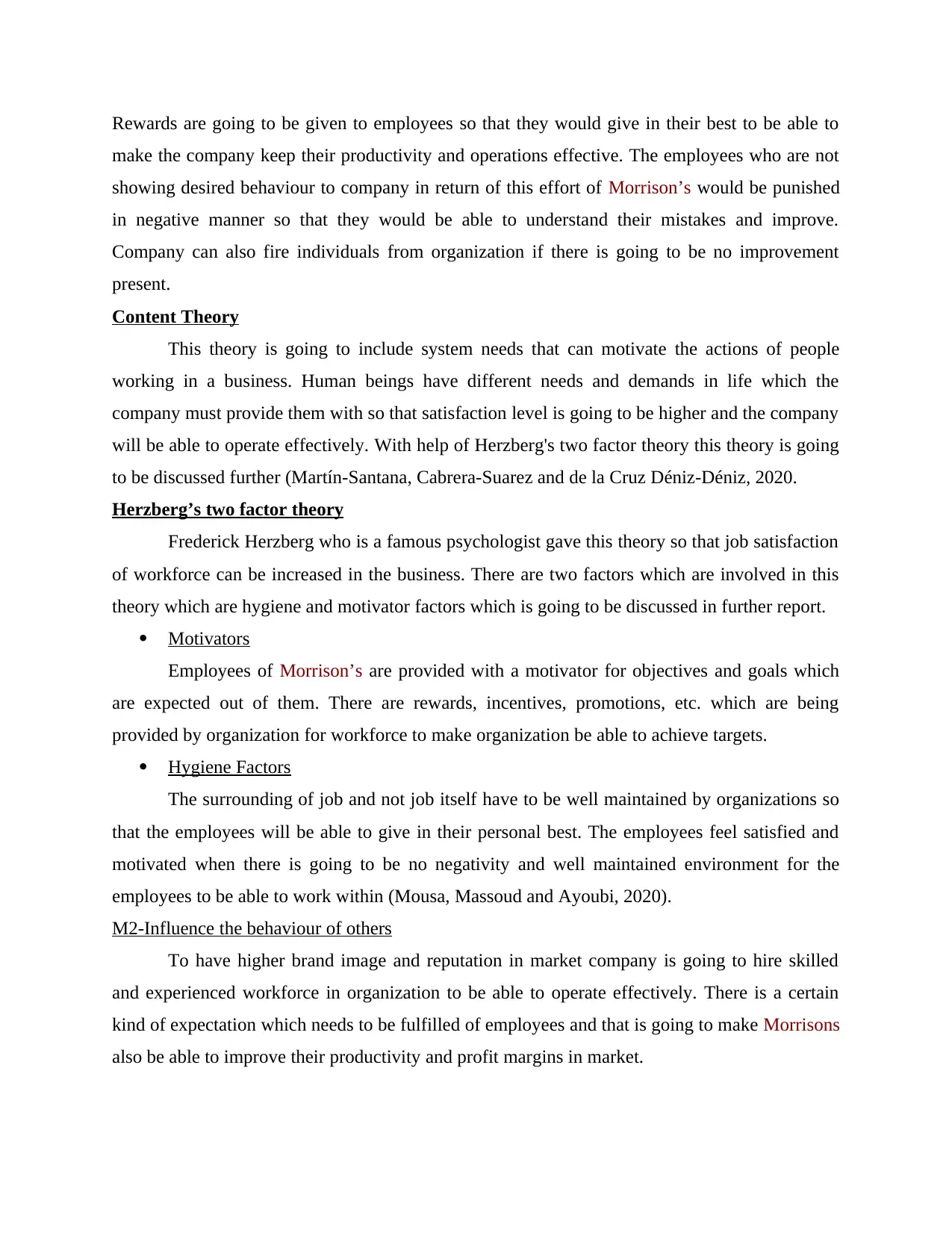
Rewards are going to be given to employees so that they would give in their best to be able to
make the company keep their productivity and operations effective. The employees who are not
showing desired behaviour to company in return of this effort of Morrison’s would be punished
in negative manner so that they would be able to understand their mistakes and improve.
Company can also fire individuals from organization if there is going to be no improvement
present.
Content Theory
This theory is going to include system needs that can motivate the actions of people
working in a business. Human beings have different needs and demands in life which the
company must provide them with so that satisfaction level is going to be higher and the company
will be able to operate effectively. With help of Herzberg's two factor theory this theory is going
to be discussed further (Martín-Santana, Cabrera-Suarez and de la Cruz Déniz-Déniz, 2020.
Herzberg’s two factor theory
Frederick Herzberg who is a famous psychologist gave this theory so that job satisfaction
of workforce can be increased in the business. There are two factors which are involved in this
theory which are hygiene and motivator factors which is going to be discussed in further report.
Motivators
Employees of Morrison’s are provided with a motivator for objectives and goals which
are expected out of them. There are rewards, incentives, promotions, etc. which are being
provided by organization for workforce to make organization be able to achieve targets.
Hygiene Factors
The surrounding of job and not job itself have to be well maintained by organizations so
that the employees will be able to give in their personal best. The employees feel satisfied and
motivated when there is going to be no negativity and well maintained environment for the
employees to be able to work within (Mousa, Massoud and Ayoubi, 2020).
M2-Influence the behaviour of others
To have higher brand image and reputation in market company is going to hire skilled
and experienced workforce in organization to be able to operate effectively. There is a certain
kind of expectation which needs to be fulfilled of employees and that is going to make Morrisons
also be able to improve their productivity and profit margins in market.
make the company keep their productivity and operations effective. The employees who are not
showing desired behaviour to company in return of this effort of Morrison’s would be punished
in negative manner so that they would be able to understand their mistakes and improve.
Company can also fire individuals from organization if there is going to be no improvement
present.
Content Theory
This theory is going to include system needs that can motivate the actions of people
working in a business. Human beings have different needs and demands in life which the
company must provide them with so that satisfaction level is going to be higher and the company
will be able to operate effectively. With help of Herzberg's two factor theory this theory is going
to be discussed further (Martín-Santana, Cabrera-Suarez and de la Cruz Déniz-Déniz, 2020.
Herzberg’s two factor theory
Frederick Herzberg who is a famous psychologist gave this theory so that job satisfaction
of workforce can be increased in the business. There are two factors which are involved in this
theory which are hygiene and motivator factors which is going to be discussed in further report.
Motivators
Employees of Morrison’s are provided with a motivator for objectives and goals which
are expected out of them. There are rewards, incentives, promotions, etc. which are being
provided by organization for workforce to make organization be able to achieve targets.
Hygiene Factors
The surrounding of job and not job itself have to be well maintained by organizations so
that the employees will be able to give in their personal best. The employees feel satisfied and
motivated when there is going to be no negativity and well maintained environment for the
employees to be able to work within (Mousa, Massoud and Ayoubi, 2020).
M2-Influence the behaviour of others
To have higher brand image and reputation in market company is going to hire skilled
and experienced workforce in organization to be able to operate effectively. There is a certain
kind of expectation which needs to be fulfilled of employees and that is going to make Morrisons
also be able to improve their productivity and profit margins in market.
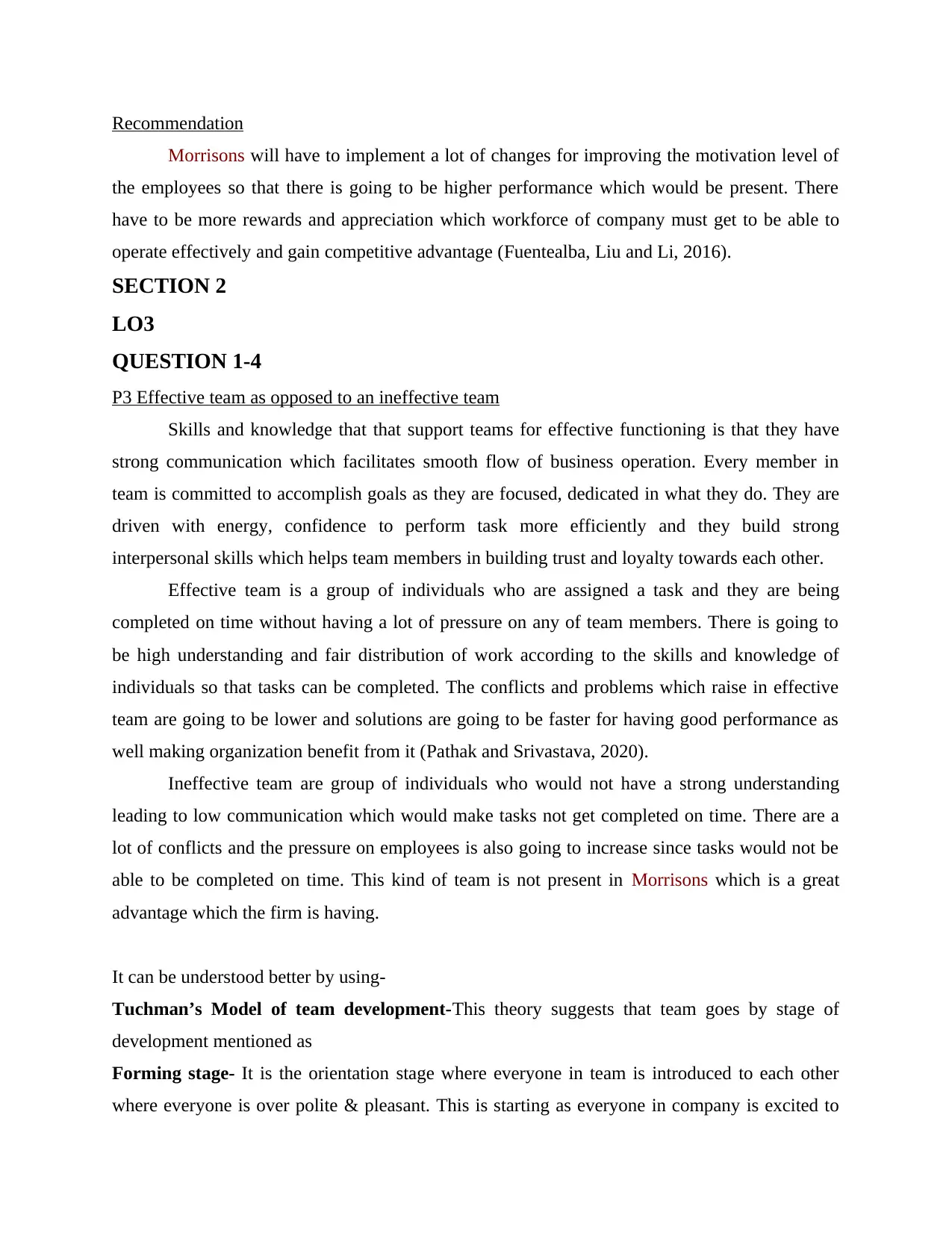
Recommendation
Morrisons will have to implement a lot of changes for improving the motivation level of
the employees so that there is going to be higher performance which would be present. There
have to be more rewards and appreciation which workforce of company must get to be able to
operate effectively and gain competitive advantage (Fuentealba, Liu and Li, 2016).
SECTION 2
LO3
QUESTION 1-4
P3 Effective team as opposed to an ineffective team
Skills and knowledge that that support teams for effective functioning is that they have
strong communication which facilitates smooth flow of business operation. Every member in
team is committed to accomplish goals as they are focused, dedicated in what they do. They are
driven with energy, confidence to perform task more efficiently and they build strong
interpersonal skills which helps team members in building trust and loyalty towards each other.
Effective team is a group of individuals who are assigned a task and they are being
completed on time without having a lot of pressure on any of team members. There is going to
be high understanding and fair distribution of work according to the skills and knowledge of
individuals so that tasks can be completed. The conflicts and problems which raise in effective
team are going to be lower and solutions are going to be faster for having good performance as
well making organization benefit from it (Pathak and Srivastava, 2020).
Ineffective team are group of individuals who would not have a strong understanding
leading to low communication which would make tasks not get completed on time. There are a
lot of conflicts and the pressure on employees is also going to increase since tasks would not be
able to be completed on time. This kind of team is not present in Morrisons which is a great
advantage which the firm is having.
It can be understood better by using-
Tuchman’s Model of team development-This theory suggests that team goes by stage of
development mentioned as
Forming stage- It is the orientation stage where everyone in team is introduced to each other
where everyone is over polite & pleasant. This is starting as everyone in company is excited to
Morrisons will have to implement a lot of changes for improving the motivation level of
the employees so that there is going to be higher performance which would be present. There
have to be more rewards and appreciation which workforce of company must get to be able to
operate effectively and gain competitive advantage (Fuentealba, Liu and Li, 2016).
SECTION 2
LO3
QUESTION 1-4
P3 Effective team as opposed to an ineffective team
Skills and knowledge that that support teams for effective functioning is that they have
strong communication which facilitates smooth flow of business operation. Every member in
team is committed to accomplish goals as they are focused, dedicated in what they do. They are
driven with energy, confidence to perform task more efficiently and they build strong
interpersonal skills which helps team members in building trust and loyalty towards each other.
Effective team is a group of individuals who are assigned a task and they are being
completed on time without having a lot of pressure on any of team members. There is going to
be high understanding and fair distribution of work according to the skills and knowledge of
individuals so that tasks can be completed. The conflicts and problems which raise in effective
team are going to be lower and solutions are going to be faster for having good performance as
well making organization benefit from it (Pathak and Srivastava, 2020).
Ineffective team are group of individuals who would not have a strong understanding
leading to low communication which would make tasks not get completed on time. There are a
lot of conflicts and the pressure on employees is also going to increase since tasks would not be
able to be completed on time. This kind of team is not present in Morrisons which is a great
advantage which the firm is having.
It can be understood better by using-
Tuchman’s Model of team development-This theory suggests that team goes by stage of
development mentioned as
Forming stage- It is the orientation stage where everyone in team is introduced to each other
where everyone is over polite & pleasant. This is starting as everyone in company is excited to
⊘ This is a preview!⊘
Do you want full access?
Subscribe today to unlock all pages.

Trusted by 1+ million students worldwide
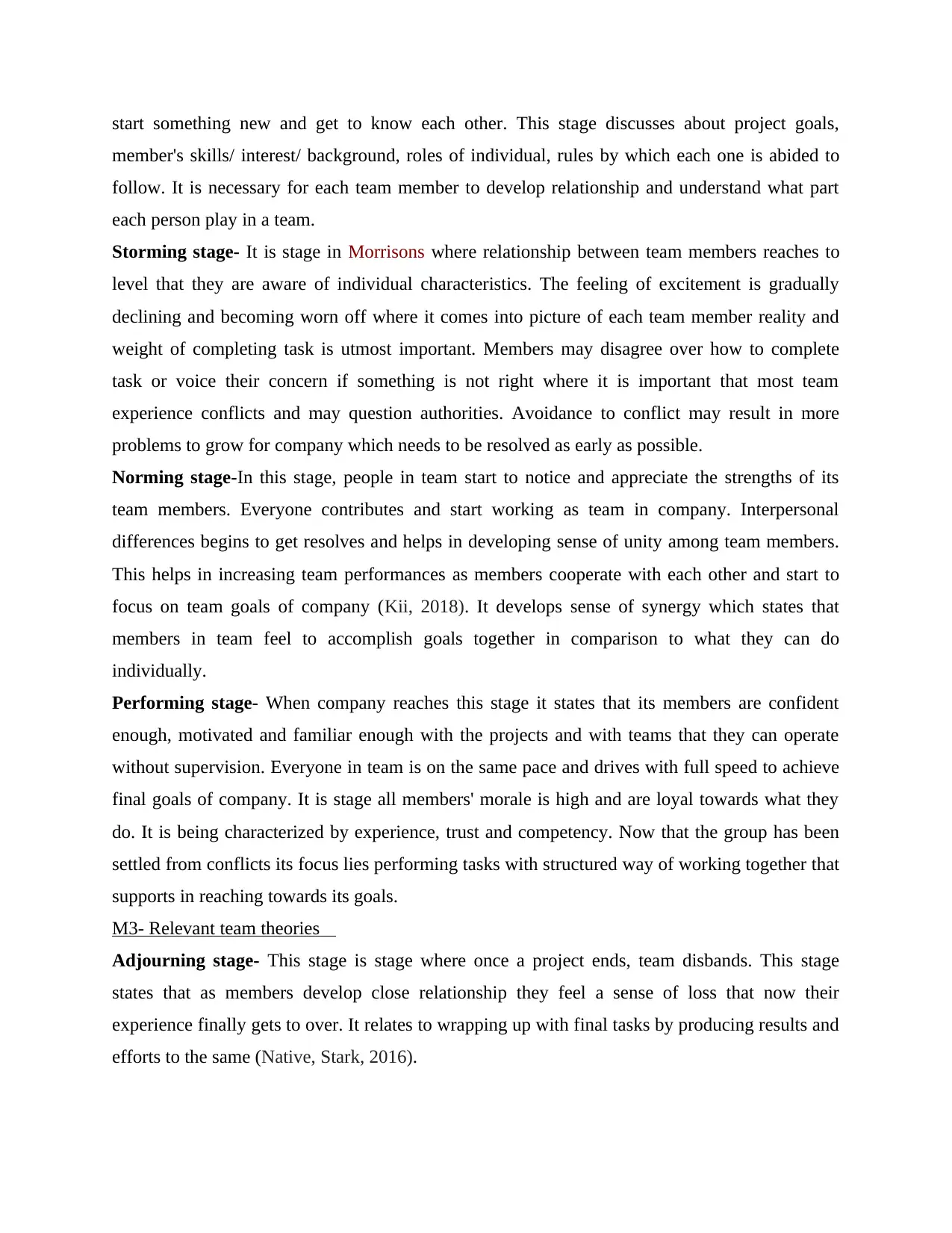
start something new and get to know each other. This stage discusses about project goals,
member's skills/ interest/ background, roles of individual, rules by which each one is abided to
follow. It is necessary for each team member to develop relationship and understand what part
each person play in a team.
Storming stage- It is stage in Morrisons where relationship between team members reaches to
level that they are aware of individual characteristics. The feeling of excitement is gradually
declining and becoming worn off where it comes into picture of each team member reality and
weight of completing task is utmost important. Members may disagree over how to complete
task or voice their concern if something is not right where it is important that most team
experience conflicts and may question authorities. Avoidance to conflict may result in more
problems to grow for company which needs to be resolved as early as possible.
Norming stage-In this stage, people in team start to notice and appreciate the strengths of its
team members. Everyone contributes and start working as team in company. Interpersonal
differences begins to get resolves and helps in developing sense of unity among team members.
This helps in increasing team performances as members cooperate with each other and start to
focus on team goals of company (Kii, 2018). It develops sense of synergy which states that
members in team feel to accomplish goals together in comparison to what they can do
individually.
Performing stage- When company reaches this stage it states that its members are confident
enough, motivated and familiar enough with the projects and with teams that they can operate
without supervision. Everyone in team is on the same pace and drives with full speed to achieve
final goals of company. It is stage all members' morale is high and are loyal towards what they
do. It is being characterized by experience, trust and competency. Now that the group has been
settled from conflicts its focus lies performing tasks with structured way of working together that
supports in reaching towards its goals.
M3- Relevant team theories
Adjourning stage- This stage is stage where once a project ends, team disbands. This stage
states that as members develop close relationship they feel a sense of loss that now their
experience finally gets to over. It relates to wrapping up with final tasks by producing results and
efforts to the same (Native, Stark, 2016).
member's skills/ interest/ background, roles of individual, rules by which each one is abided to
follow. It is necessary for each team member to develop relationship and understand what part
each person play in a team.
Storming stage- It is stage in Morrisons where relationship between team members reaches to
level that they are aware of individual characteristics. The feeling of excitement is gradually
declining and becoming worn off where it comes into picture of each team member reality and
weight of completing task is utmost important. Members may disagree over how to complete
task or voice their concern if something is not right where it is important that most team
experience conflicts and may question authorities. Avoidance to conflict may result in more
problems to grow for company which needs to be resolved as early as possible.
Norming stage-In this stage, people in team start to notice and appreciate the strengths of its
team members. Everyone contributes and start working as team in company. Interpersonal
differences begins to get resolves and helps in developing sense of unity among team members.
This helps in increasing team performances as members cooperate with each other and start to
focus on team goals of company (Kii, 2018). It develops sense of synergy which states that
members in team feel to accomplish goals together in comparison to what they can do
individually.
Performing stage- When company reaches this stage it states that its members are confident
enough, motivated and familiar enough with the projects and with teams that they can operate
without supervision. Everyone in team is on the same pace and drives with full speed to achieve
final goals of company. It is stage all members' morale is high and are loyal towards what they
do. It is being characterized by experience, trust and competency. Now that the group has been
settled from conflicts its focus lies performing tasks with structured way of working together that
supports in reaching towards its goals.
M3- Relevant team theories
Adjourning stage- This stage is stage where once a project ends, team disbands. This stage
states that as members develop close relationship they feel a sense of loss that now their
experience finally gets to over. It relates to wrapping up with final tasks by producing results and
efforts to the same (Native, Stark, 2016).
Paraphrase This Document
Need a fresh take? Get an instant paraphrase of this document with our AI Paraphraser
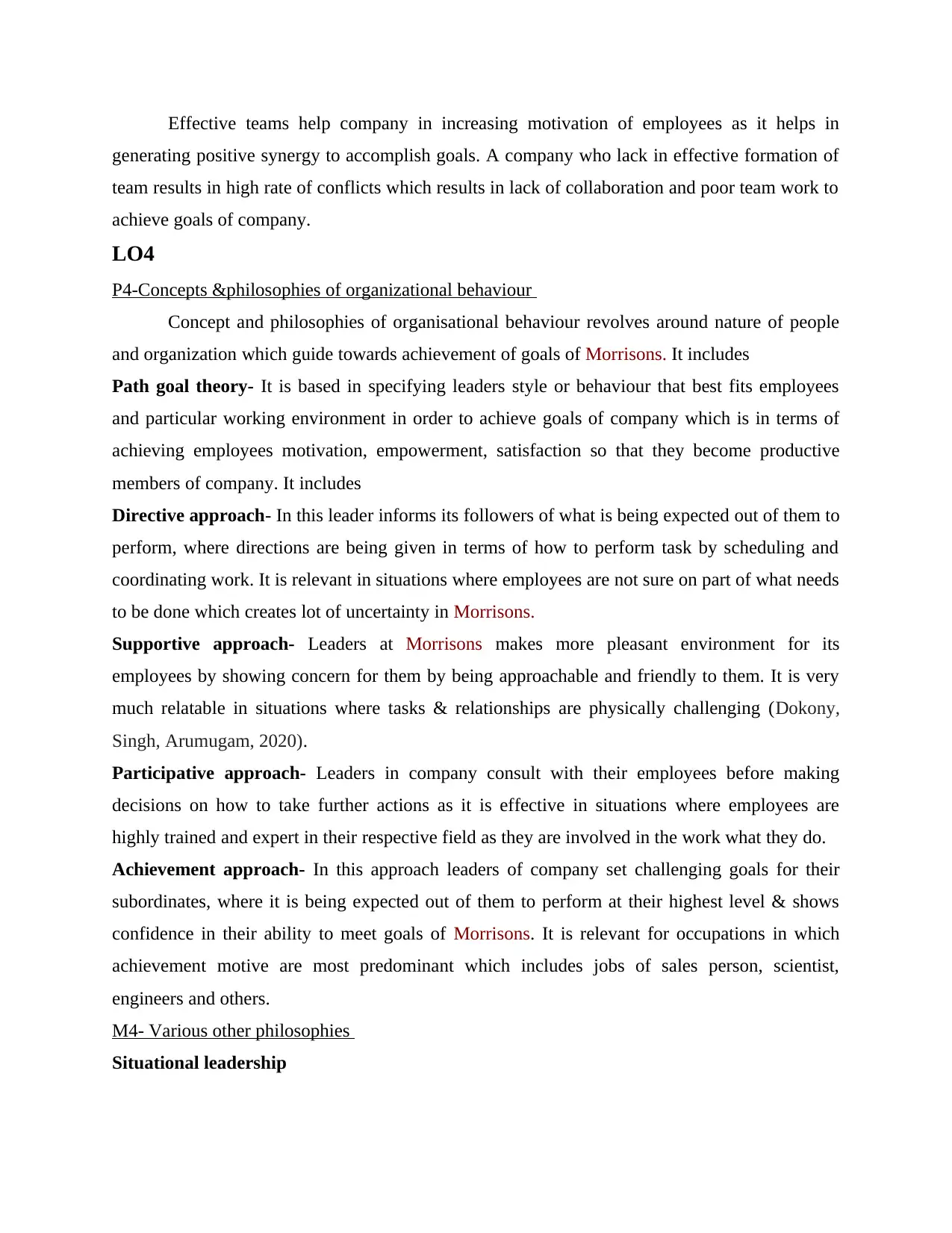
Effective teams help company in increasing motivation of employees as it helps in
generating positive synergy to accomplish goals. A company who lack in effective formation of
team results in high rate of conflicts which results in lack of collaboration and poor team work to
achieve goals of company.
LO4
P4-Concepts &philosophies of organizational behaviour
Concept and philosophies of organisational behaviour revolves around nature of people
and organization which guide towards achievement of goals of Morrisons. It includes
Path goal theory- It is based in specifying leaders style or behaviour that best fits employees
and particular working environment in order to achieve goals of company which is in terms of
achieving employees motivation, empowerment, satisfaction so that they become productive
members of company. It includes
Directive approach- In this leader informs its followers of what is being expected out of them to
perform, where directions are being given in terms of how to perform task by scheduling and
coordinating work. It is relevant in situations where employees are not sure on part of what needs
to be done which creates lot of uncertainty in Morrisons.
Supportive approach- Leaders at Morrisons makes more pleasant environment for its
employees by showing concern for them by being approachable and friendly to them. It is very
much relatable in situations where tasks & relationships are physically challenging (Dokony,
Singh, Arumugam, 2020).
Participative approach- Leaders in company consult with their employees before making
decisions on how to take further actions as it is effective in situations where employees are
highly trained and expert in their respective field as they are involved in the work what they do.
Achievement approach- In this approach leaders of company set challenging goals for their
subordinates, where it is being expected out of them to perform at their highest level & shows
confidence in their ability to meet goals of Morrisons. It is relevant for occupations in which
achievement motive are most predominant which includes jobs of sales person, scientist,
engineers and others.
M4- Various other philosophies
Situational leadership
generating positive synergy to accomplish goals. A company who lack in effective formation of
team results in high rate of conflicts which results in lack of collaboration and poor team work to
achieve goals of company.
LO4
P4-Concepts &philosophies of organizational behaviour
Concept and philosophies of organisational behaviour revolves around nature of people
and organization which guide towards achievement of goals of Morrisons. It includes
Path goal theory- It is based in specifying leaders style or behaviour that best fits employees
and particular working environment in order to achieve goals of company which is in terms of
achieving employees motivation, empowerment, satisfaction so that they become productive
members of company. It includes
Directive approach- In this leader informs its followers of what is being expected out of them to
perform, where directions are being given in terms of how to perform task by scheduling and
coordinating work. It is relevant in situations where employees are not sure on part of what needs
to be done which creates lot of uncertainty in Morrisons.
Supportive approach- Leaders at Morrisons makes more pleasant environment for its
employees by showing concern for them by being approachable and friendly to them. It is very
much relatable in situations where tasks & relationships are physically challenging (Dokony,
Singh, Arumugam, 2020).
Participative approach- Leaders in company consult with their employees before making
decisions on how to take further actions as it is effective in situations where employees are
highly trained and expert in their respective field as they are involved in the work what they do.
Achievement approach- In this approach leaders of company set challenging goals for their
subordinates, where it is being expected out of them to perform at their highest level & shows
confidence in their ability to meet goals of Morrisons. It is relevant for occupations in which
achievement motive are most predominant which includes jobs of sales person, scientist,
engineers and others.
M4- Various other philosophies
Situational leadership
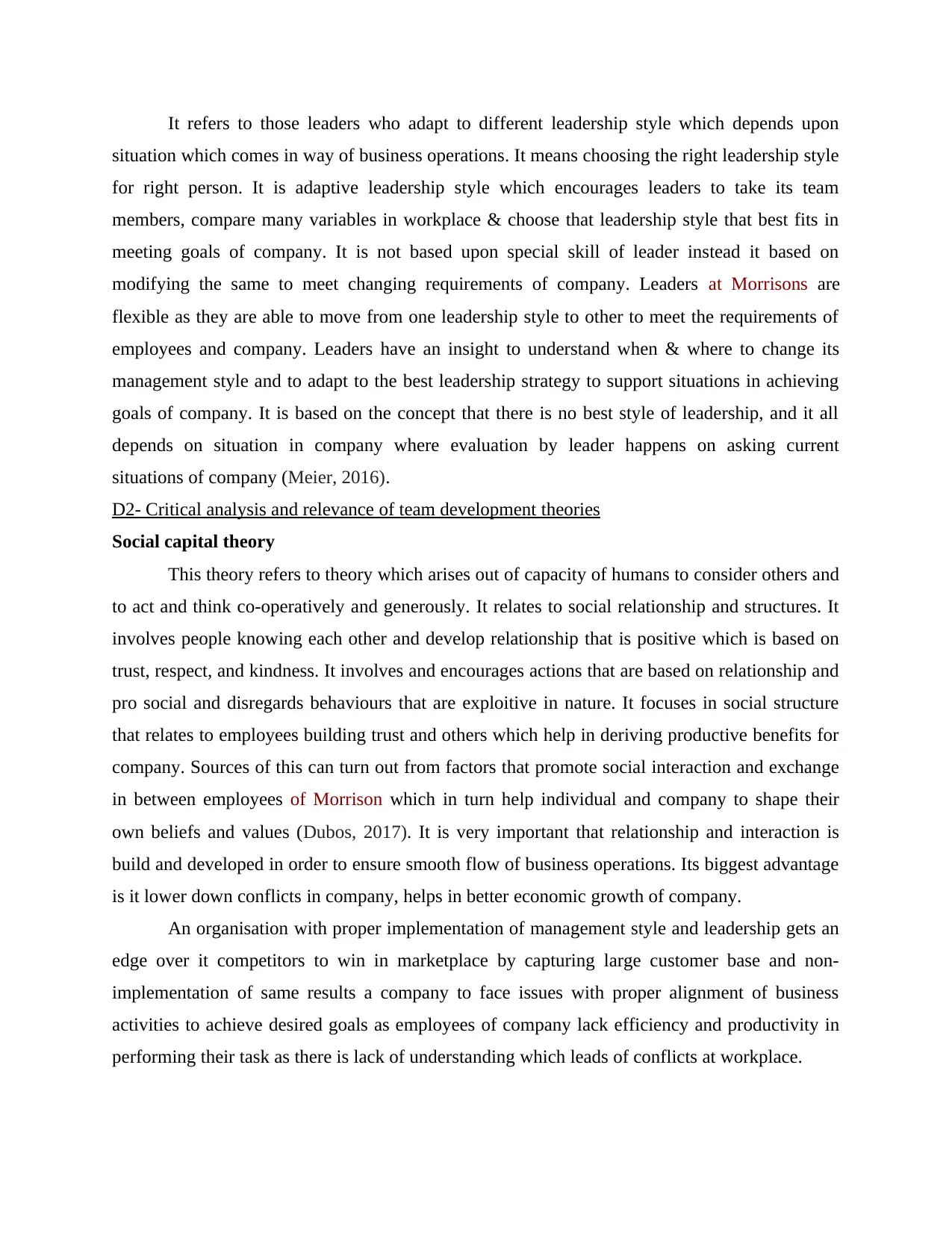
It refers to those leaders who adapt to different leadership style which depends upon
situation which comes in way of business operations. It means choosing the right leadership style
for right person. It is adaptive leadership style which encourages leaders to take its team
members, compare many variables in workplace & choose that leadership style that best fits in
meeting goals of company. It is not based upon special skill of leader instead it based on
modifying the same to meet changing requirements of company. Leaders at Morrisons are
flexible as they are able to move from one leadership style to other to meet the requirements of
employees and company. Leaders have an insight to understand when & where to change its
management style and to adapt to the best leadership strategy to support situations in achieving
goals of company. It is based on the concept that there is no best style of leadership, and it all
depends on situation in company where evaluation by leader happens on asking current
situations of company (Meier, 2016).
D2- Critical analysis and relevance of team development theories
Social capital theory
This theory refers to theory which arises out of capacity of humans to consider others and
to act and think co-operatively and generously. It relates to social relationship and structures. It
involves people knowing each other and develop relationship that is positive which is based on
trust, respect, and kindness. It involves and encourages actions that are based on relationship and
pro social and disregards behaviours that are exploitive in nature. It focuses in social structure
that relates to employees building trust and others which help in deriving productive benefits for
company. Sources of this can turn out from factors that promote social interaction and exchange
in between employees of Morrison which in turn help individual and company to shape their
own beliefs and values (Dubos, 2017). It is very important that relationship and interaction is
build and developed in order to ensure smooth flow of business operations. Its biggest advantage
is it lower down conflicts in company, helps in better economic growth of company.
An organisation with proper implementation of management style and leadership gets an
edge over it competitors to win in marketplace by capturing large customer base and non-
implementation of same results a company to face issues with proper alignment of business
activities to achieve desired goals as employees of company lack efficiency and productivity in
performing their task as there is lack of understanding which leads of conflicts at workplace.
situation which comes in way of business operations. It means choosing the right leadership style
for right person. It is adaptive leadership style which encourages leaders to take its team
members, compare many variables in workplace & choose that leadership style that best fits in
meeting goals of company. It is not based upon special skill of leader instead it based on
modifying the same to meet changing requirements of company. Leaders at Morrisons are
flexible as they are able to move from one leadership style to other to meet the requirements of
employees and company. Leaders have an insight to understand when & where to change its
management style and to adapt to the best leadership strategy to support situations in achieving
goals of company. It is based on the concept that there is no best style of leadership, and it all
depends on situation in company where evaluation by leader happens on asking current
situations of company (Meier, 2016).
D2- Critical analysis and relevance of team development theories
Social capital theory
This theory refers to theory which arises out of capacity of humans to consider others and
to act and think co-operatively and generously. It relates to social relationship and structures. It
involves people knowing each other and develop relationship that is positive which is based on
trust, respect, and kindness. It involves and encourages actions that are based on relationship and
pro social and disregards behaviours that are exploitive in nature. It focuses in social structure
that relates to employees building trust and others which help in deriving productive benefits for
company. Sources of this can turn out from factors that promote social interaction and exchange
in between employees of Morrison which in turn help individual and company to shape their
own beliefs and values (Dubos, 2017). It is very important that relationship and interaction is
build and developed in order to ensure smooth flow of business operations. Its biggest advantage
is it lower down conflicts in company, helps in better economic growth of company.
An organisation with proper implementation of management style and leadership gets an
edge over it competitors to win in marketplace by capturing large customer base and non-
implementation of same results a company to face issues with proper alignment of business
activities to achieve desired goals as employees of company lack efficiency and productivity in
performing their task as there is lack of understanding which leads of conflicts at workplace.
⊘ This is a preview!⊘
Do you want full access?
Subscribe today to unlock all pages.

Trusted by 1+ million students worldwide
1 out of 15
Related Documents
Your All-in-One AI-Powered Toolkit for Academic Success.
+13062052269
info@desklib.com
Available 24*7 on WhatsApp / Email
![[object Object]](/_next/static/media/star-bottom.7253800d.svg)
Unlock your academic potential
Copyright © 2020–2026 A2Z Services. All Rights Reserved. Developed and managed by ZUCOL.



